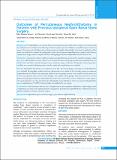Please use this identifier to cite or link to this item:
https://hdl.handle.net/20.500.14356/1287| Title: | Outcomes of Percutaneous Nephrolithotomy in Patients with Previous Ipsilateral Open Renal Stone Surgery |
| Authors: | Basnet, Robin Bahadur Shrestha, Anil Shrestha, Parash Mani Joshi, Biswa Raj |
| Citation: | BasnetR. B., ShresthaA., ShresthaP. M., & JoshiB. R. (2020). Outcomes of Percutaneous Nephrolithotomy in Patients with Previous Ipsilateral Open Renal Stone Surgery. Journal of Nepal Health Research Council, 18(2), 277-281. https://doi.org/10.33314/jnhrc.v18i2.2285 |
| Issue Date: | 2020 |
| Publisher: | Nepal Health Research Council |
| Article Type: | Original Article |
| Keywords: | Complications open renal stone surgery percutaneous nephrolithotomy |
| Series/Report no.: | Apr-June, 2020;2285 |
| Abstract: | Abstract Background: Nephrolithiais is a recurrent disease. Recent advances have enabled stone surgeries to be performed by minimal invasive techniques; but still a large number of patients present with history of ipsilateral open renal stone surgery. Previous scar to the kidney and overlying muscles are fraught with possibility of increased complications. This study was conducted to evaluate the perioperative results of percutaneous nephrolithotomy in patients with a history of open stone surgery and to compare with those undergoing percutaneous nephrolithotomy for the first time. Methods: A retrospective study of all the percutaneous nephrolithotomy performed by standard technique within four years at Bir Hospital was made. Patients were divided into those undergoing percutaneous nephrolithotomy for the first time and those who had undergone open renal stone surgery in the past. Preoperative and intraoperative variables were recorded and postoperative stone free status and complications were evaluated. Results: Six hundred and twenty seven patients; out of 691, who had undergone percutaneous nephrolithotomy were included. Demographic variables and stone characteristics were similar in the two study groups. percutaneous nephrolithotomy was found to be statistically similar in the two groups in terms of the number of tracts made (p= 0.1642) and operative time (0.9197). Exit strategies were similar in both groups. Stone free rate was 83.33% in patients undergoing percutaneous nephrolithotomy for first time and 82.08% in those with history of open surgery. Average hospital stay was 3 days in both groups. Although the group with history of previous surgery had significantly more complications (p= 0.0207), Clavien grading was similar in the two groups. Conclusions: This study shows that the rate of complications is more in patients with history of open surgery, most complications are minor, not requiring intensive management. percutaneous nephrolithotomy is efficient and safe in patients with history of open renal stone surgery. Keywords: Complications; open renal stone surgery; percutaneous nephrolithotomy |
| Description: | Original Article |
| URI: | http://103.69.126.140:8080/handle/20.500.14356/1287 |
| ISSN: | Print ISSN: 1727-5482; Online ISSN: 1999-6217 |
| Appears in Collections: | Vol. 18 No. 2 Issue 47 Apr-Jun 2020 |
Files in This Item:
| File | Description | Size | Format | |
|---|---|---|---|---|
| 2285-Manuscript-17531-1-10-20200911.pdf | Fulltext Download | 194.06 kB | Adobe PDF |  View/Open |
Items in DSpace are protected by copyright, with all rights reserved, unless otherwise indicated.
